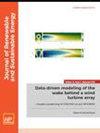A procedure set to construct the optimal energy saving retrofit strategy for old residential buildings in China
IF 1.9
4区 工程技术
Q4 ENERGY & FUELS
引用次数: 2
Abstract
A key strategy for lowering emissions and reducing the effects of climate change is to execute energy-saving retrofits in residential buildings. Despite extensive research on different retrofit pathways for building energy efficiency, the current retrofitting of the aged housing stock in China is still constrained by several factors, including occupant willingness, government financial situation, and low energy prices, so that retrofitting projects are almost entirely government-led and most of the solutions of existing studies are not applicable. Therefore, a comprehensive optimization framework for low-budget compliance retrofit strategies in the Chinese context is urgently needed. In order to fill this gap, this study established a set of procedures for developing optimal energy-saving retrofit scheme in old residential buildings in Nanjing city. The results showed that the optimal scheme can reduce 18.52% of residential building energy consumption in five central districts of Nanjing City, and the total energy saving is about 260.43 GWh. The study also showed that improving wall insulation and HVAC (Heating, Ventilation, and Air Conditioning) systems were the most efficient retrofit measures but came at a high cost. Setting a reasonable air conditioning target temperature was further identified as the most cost-effective retrofit measure. This study provided a mechanism for district-level retrofit planners to formulate a strategy that may take the performance of retrofitting on the environment and the economy into account while still adhering to code requirements.建立了构建中国旧住宅节能改造最佳策略的程序
降低排放和减少气候变化影响的一个关键战略是对住宅建筑进行节能改造。尽管对不同的建筑节能改造途径进行了广泛的研究,但目前中国老年住房存量改造仍受到几个因素的制约,包括居住意愿、政府财政状况和低能源价格,因此,改造项目几乎完全由政府主导,现有研究的大多数解决方案都不适用。因此,迫切需要一个在中国背景下的低预算合规改造战略的全面优化框架。为了填补这一空白,本研究建立了一套南京市老旧住宅节能改造优化方案的制定程序。结果表明,优化方案可使南京市五个中心区的住宅建筑能耗降低18.52%,总节能约260.43 GWh。研究还表明,改善墙壁隔热和暖通空调系统是最有效的改造措施,但成本高昂。设定合理的空调目标温度被进一步确定为最具成本效益的改造措施。这项研究为地区一级的改造规划者提供了一种机制,可以制定一项战略,在遵守规范要求的同时,考虑改造对环境和经济的影响。
本文章由计算机程序翻译,如有差异,请以英文原文为准。
求助全文
约1分钟内获得全文
求助全文
来源期刊

Journal of Renewable and Sustainable Energy
ENERGY & FUELS-ENERGY & FUELS
CiteScore
4.30
自引率
12.00%
发文量
122
审稿时长
4.2 months
期刊介绍:
The Journal of Renewable and Sustainable Energy (JRSE) is an interdisciplinary, peer-reviewed journal covering all areas of renewable and sustainable energy relevant to the physical science and engineering communities. The interdisciplinary approach of the publication ensures that the editors draw from researchers worldwide in a diverse range of fields.
Topics covered include:
Renewable energy economics and policy
Renewable energy resource assessment
Solar energy: photovoltaics, solar thermal energy, solar energy for fuels
Wind energy: wind farms, rotors and blades, on- and offshore wind conditions, aerodynamics, fluid dynamics
Bioenergy: biofuels, biomass conversion, artificial photosynthesis
Distributed energy generation: rooftop PV, distributed fuel cells, distributed wind, micro-hydrogen power generation
Power distribution & systems modeling: power electronics and controls, smart grid
Energy efficient buildings: smart windows, PV, wind, power management
Energy conversion: flexoelectric, piezoelectric, thermoelectric, other technologies
Energy storage: batteries, supercapacitors, hydrogen storage, other fuels
Fuel cells: proton exchange membrane cells, solid oxide cells, hybrid fuel cells, other
Marine and hydroelectric energy: dams, tides, waves, other
Transportation: alternative vehicle technologies, plug-in technologies, other
Geothermal energy
 求助内容:
求助内容: 应助结果提醒方式:
应助结果提醒方式:


